Honorable mention at 2020 fanheart3 awards, The Metamovie Presents: Alien Rescue is a production where you can physically join the story and manipulate it to your pleasure. A reflection on why this work could be exactly what fans were looking for.
 Leggi questo articolo in Italiano
Leggi questo articolo in Italiano
At the last Venice Film Festival, I was blown away by the kind of production I wanted to see my whole life. A work that shout out loud that I may be the audience,but how the story goes is up to me and I have power over the narrative and the characters.
Which is a power that, as fans, we’re aware we have…but that authors are often reluctant to surrender.
What is something to avoid for some producers (*coughCWcough*) is the main goal for Jason Moore, director of The Metamovie Presents: Alien Rescue.
This VR piece was in the lineup of the VeniceVR Expanded. In this story, “you play a character hired by a team of alien-rights activists to help them rescue a rare and dangerous creature from captivity. You must break into the Kelosite Research Facility, avoid being caught, killed or eaten, and try to accomplish the mission” (from Alien Rescue press book)
So in this story you, the user, are much more than a spectator.
Before putting on the headset, you can choose who you want to play: the main hero of the story, who literally leads the narrative, or an active witness to it in the role of an eyebot following the other characters.
Next to you, real actors playing these characters respond to your commands and decisions. And if that’s not enough to pique your interest as a fan, read on to find out why fanheart3 fell in love with this work.
The connection between Alien Rescue and fan culture
The Metamovie Presents: Alien Rescue received a honorable mention at the 2020 fanheart3 awards of the 77th Venice Film Festival.
“In the 2020 edition the fanheart3 awards jury also awarded a special mention to The Metamovie Presents: Alien Rescue, directed by Jason Moore. This work, in fact, gives the user not only the chance to join the story, but also the possibility to become its co-creator. It also opens up surprising interactive possibilities as the “hero”, allowing the user to be the main character of the story and to decide what kind of relationship they want to have with the others“
Jury of the Fanheart3 Awards 2020
But Alien Rescue was also the strongest contender for our VR Fan Experience award. Accessibility made the judges opt for another choice, but the love was there.
In this article, we’ll look at some of the reasons why Alien Rescue could mark a turning point in fan culture and make many of us – regardless of fandom – a little more curious about XR and the kinds of productions that come out of this medium.
- About the story
- About roleplaying
- About worldbuilding and characters
- About the future of storytelling
- Find out more about Alien Rescue in this video by Jason Moore
At the beginning of it all: the fans and the story
“When I was nine my parents took me to see Star Wars, the original one from 1977. There was a scene when Luke Skywalker was in the cockpit of the Millennium Falcon, shooting at the tie fighters and Han Solo turned to him and said “Great shot, kid”. And there, in that moment, was when I realized that all I wanted was to be in that spaceship right next to Luke Skywalker and be part of all that excitement”
From XRMust’s interview to Jason Moore
First of all: I know you all know what we’re talking about there.
You remember everything about that scene – setting, characters’ expressions, emotions – as I remember everything about it, because both you and I felt the same need expressed by Jason Moore.
To be there with Luke or, depending on your taste in characters, join Han Solo on his adventures. In other words, be as much a part of the Star Wars universe as those characters were. And you loved Star Wars for making you feel like this.
How do I know it? Because 40 years and 11 movies later (not counting the animated movie, the series, the books, the sports, religions and … well, many other things), there are still 400 fanfictions produced every day about this saga, and this counting just a single fanfictions archive. There are new cosplayers each day. Star Wars is still among the Top 20 most used fandom tags on Tumblr (2020 fandometrics report). And let’s not even talk about The Mandalorian and Baby Yoda. There’s no need to mention how popular it is, right?

But this need to be inside the story is not unique to Star Wars, of course. You’ve felt it for every single fandom you’ve fallen in love with, big or small. Most of the time, it was the main reason you fell in love with it.
Mind you, it doesn’t always mean you want to find yourself in the world (I love The Terror, but boy would I rather not spend my days with Tuunbaq and scurvy). But it always means you want to be the one to rule it, almost like a God, to make it go in the direction you choose.
This happens because the moment you love something enough to be creative about it, the story is no longer just the author’s story, but becomes a joint possession.
In The Metamovie Presents: Alien Rescue you have this… and you also have more. Being part of the story, here, means directing it to go in the direction you want it to go, but at the same time it means directing it from within.
It’s the final step toward Authorship we are never allowed to take and it’s the concept this VR production is based on.
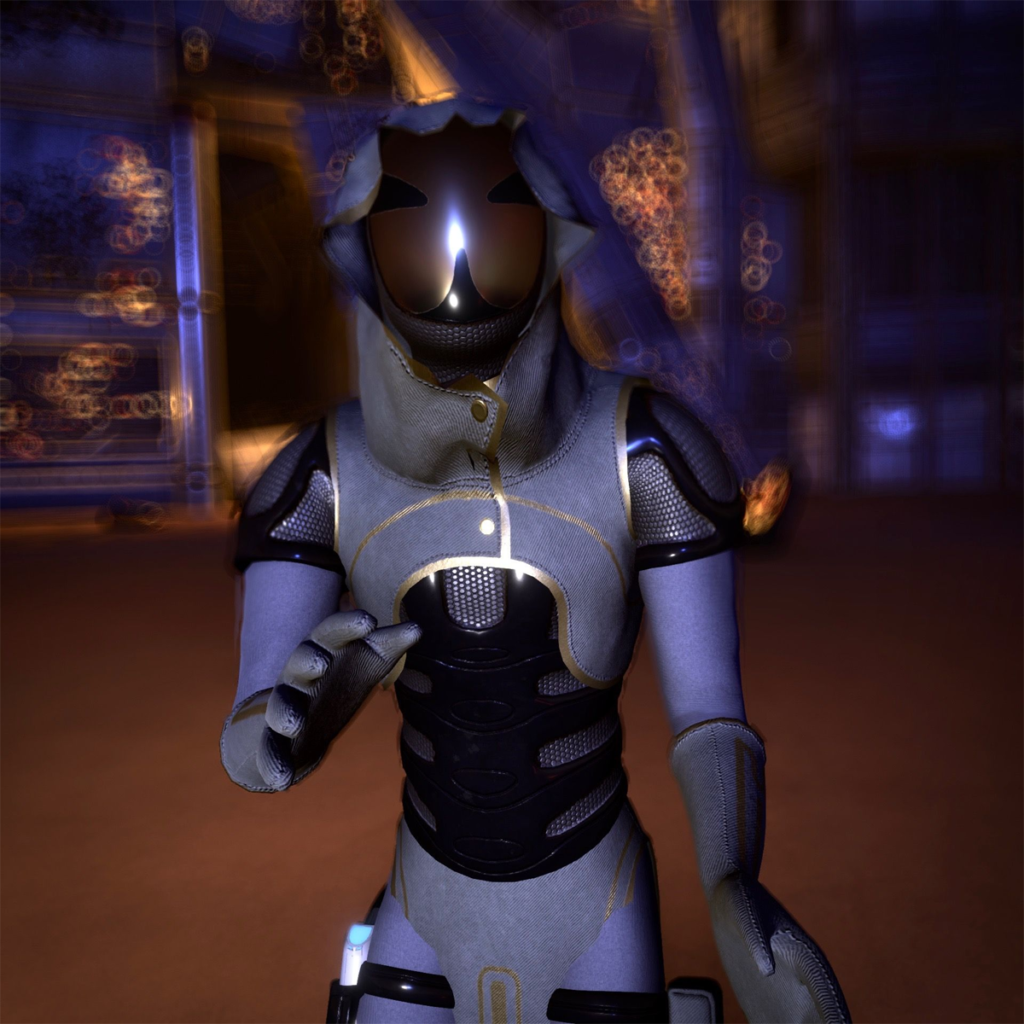
There’s a story, there’s scenes that the director wants to happen and – of course – there’s a mission that we’re trying to finish. But at the same time there are multiple endings and there are characters who improvise their responses based on what you say and how you decide to play your role.
Does this approach sound familiar? If so, you probably know what D&D and role-playing games are.
Virtual reality meets Dungeons and Dragons: roleplaying in Alien Rescue
I started playing D&D just a couple of years ago. At about the same time I experienced VR for the first time. And what really impressed me from moment one is how much the role of “director” of a VR experience resembles the one of the Master in a D&D campaign.
If you’ve never tried VR (or I should probably call it XR – extended reality – which encompasses the different expressions that immersive works of this type can take on), you are probably imagining a shooting videogame where zombies scare you too much (I did) and you’re wondering what I’m even talking about.
XR is so much more than that. My favorite experiences take you inside a world that is fictional but feels so real to your brain that a part of you, the instinctive part, believes it.
Characters, even when you don’t actively interact with them, are almost tangible and physically take shape around you.
And when you’re lucky enough to join an XR experience based on immersive theatre, you often find yourself being one of these characters and can act accordingly, as many do in LARP or DnD.
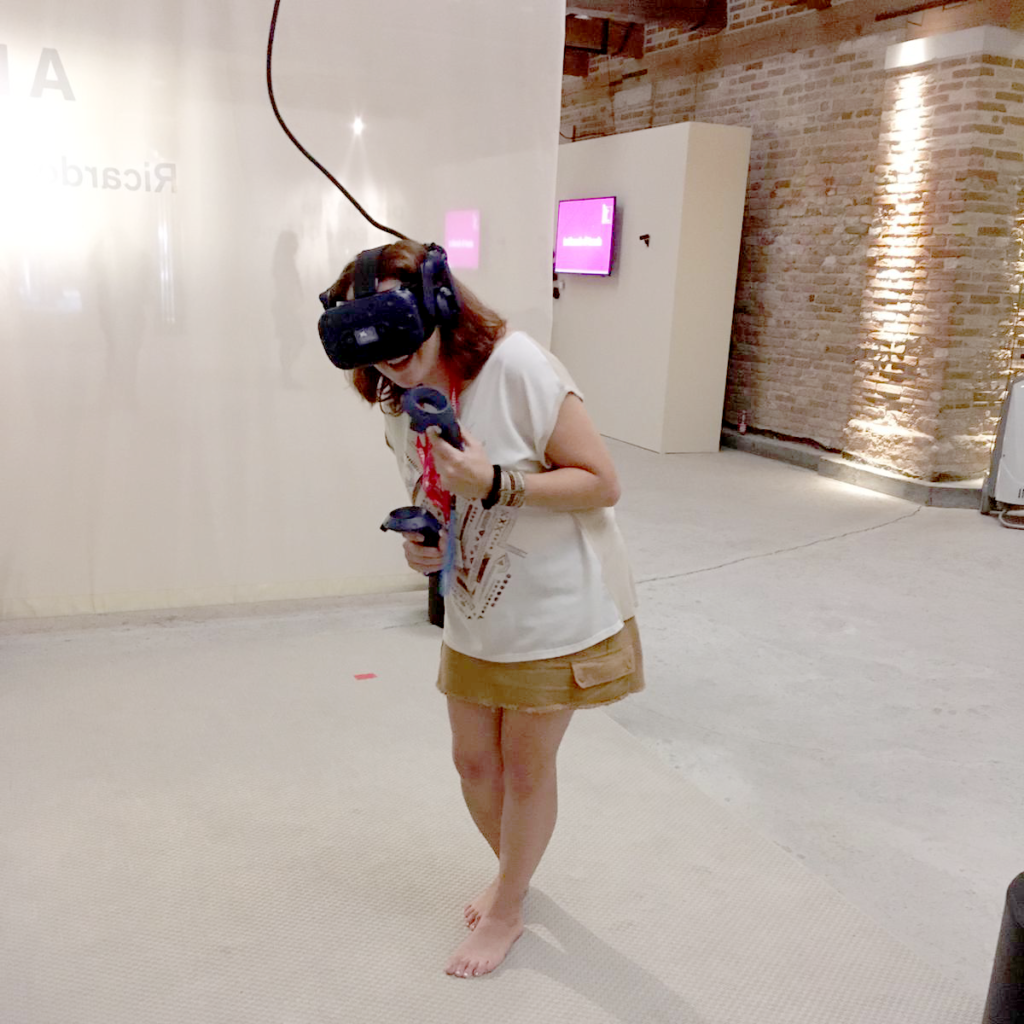
There are many role-playing activities out there, and there are many types of XR experiences. But there’s one question they all have in common, and that is: how much can the author direct the story in the direction they want it to go, and how much can they pander to the ideas of the users/players?
This is a question that is very pregnant in all of Jason Moore’s work. He talked about it in the interview we mentioned earlier, where he pointed out that to work on Alien Rescue, he hired a D&D master with 30 years of experience as a consultant.
It’s a choice that makes complete sense because Alien Rescue is not a live roleplay without a script – something that can be found in many social VR platforms such as VR Chat and that does not require much expertise.
Instead, we are talking about a story that starts at some point, has a middle and will reach a certain ending (or rather, endings). There needs to be a way to move your heroes in that direction, while still giving them enough freedom to create their own unique path toward it.
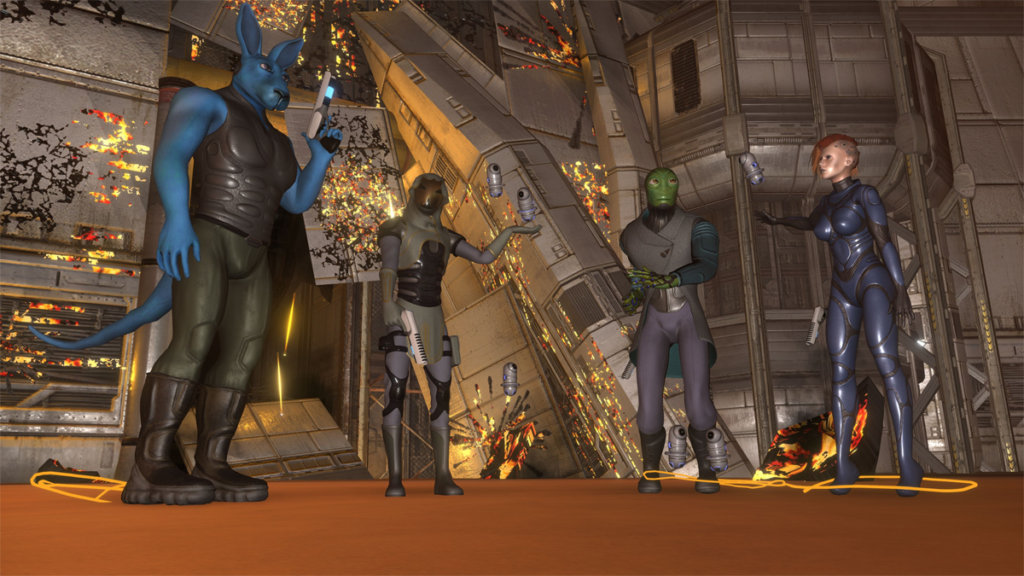
It’s a way of operating that finds theoretical explanations and examples in D&D, but is still fairly new to the XR scene and metamovies. In Alien Rescue one of the main supports for this are the actors who join the experience alongside you.
“It is all about managing and guiding [the user/hero]. Instead of having one dungeon master and a lot of players in a metamovie, my actors are all the Dungeon Masters; five of them working together to shape the story for our one hero and our eyebots”.
Jason Moore on XRMust
They tailor their responses to your acting and if you’re on the shy side, they encourage you or find ways to make you feel at ease without pressing you into the interaction. And even though, of the six possible endings, the Heroes in Alien Rescue often choose the “vanilla” one, the choice to do something different is always there. And it opens up your role to incredible possibilities.
World exploration and characters exploration: the two sides of the coin in fan culture
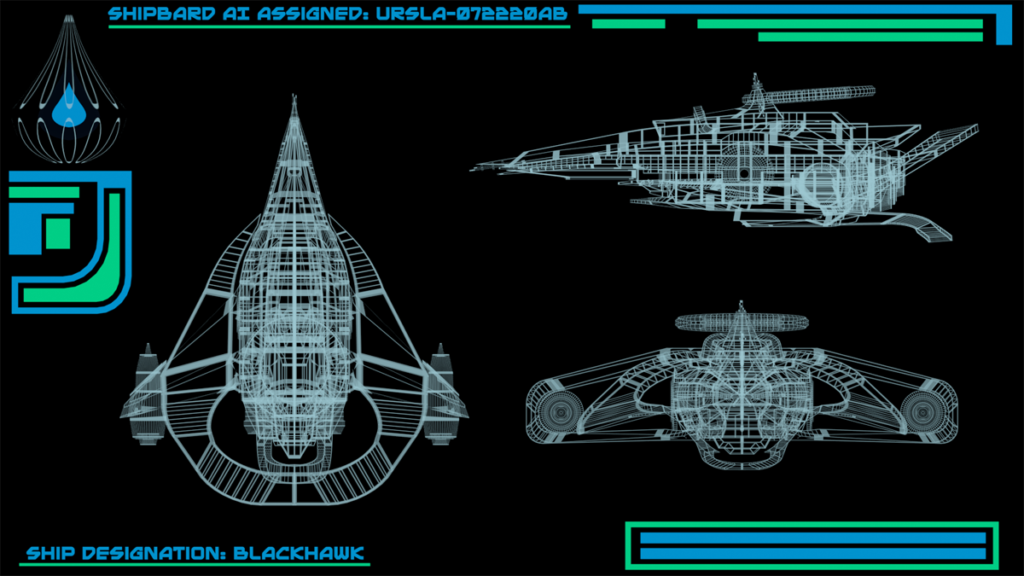
“For some, the program’s fascination lies in its detailed construction of a coherent and believable alien culture […]. For others, the interest of the series was its vivid exploration of male friendship, a theme central to many police and detective series”
Henry Jenkins (1992) speaking about Alien Nation
These two approaches to media productions are fluid for many users (you can love Star Trek tech, but you can also dream of Kirk and Spock kissing) and are both fundamental aspects of a story.
Personally, I found myself quite represented by the second group indicated by Jenkins.
Characters are my main interest and the relationships between them are the focus of my attention when I read a book or watch a movie. In the research that Susanna Norbiato and I presented for the Innovations and Tensions. Italian Cinema and Media in a Global World conference in 2017 (x), the relevance of well-written characters with believable and thought-provoking dynamics with the other characters in the story was confirmed as one of the main reasons why fandoms arise.
But there’s no denying that science fiction, fantasy productions, even westerns – those productions set in a world different from ours and with its own laws and characteristics – often captures fans’ attention more than others, because they appeal to their imagination.
The Metamovie Presents: Alien Rescue takes into consideration both things – world building and character building – and fuse them to create something that is born for fans.
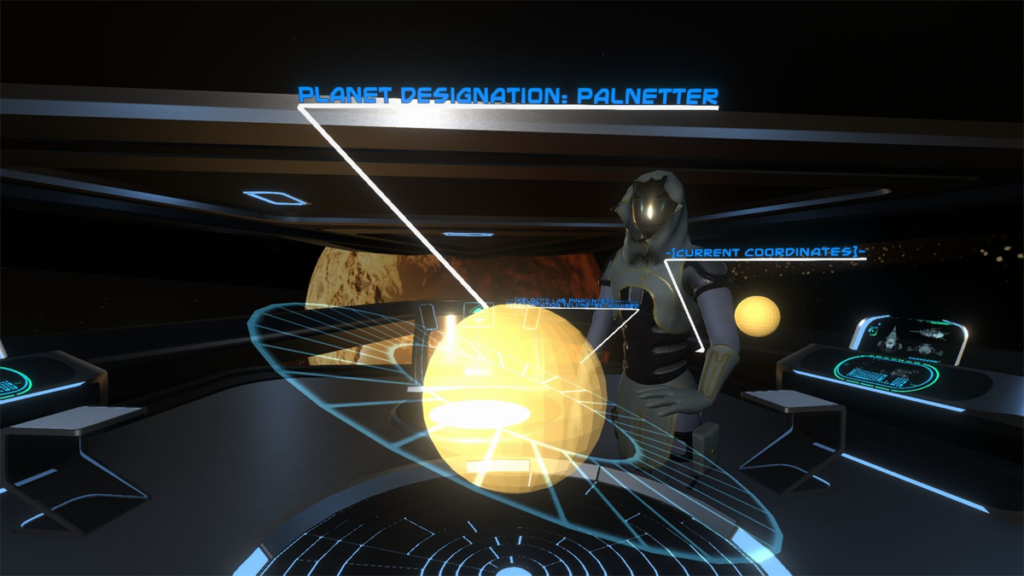
On one side, you have a sci-fi situation: you are in this big spaceship (well, immense spaceship would be more accurate), the Blackhawk. Most of the characters next to you have no human traits. You yourself are from another planet – which you are asked to say something about at the beginning of the experience – and are all geared up to fight the baddies.
On the other hand, the live actors next to you give you the opportunity to play with them and create the interactions you want with them.
It is true that not every user/hero goes for it: you’re live acting, after all, and you’re also in front of a dozen eyebots, which you know are a dozen other users observing your every move. Shyness and anxiety are right behind the corner. And, furthermore, people are not used to experiences like this one, as Jason Moore highlighted:
“There’s much more agency [in Alien Rescue] that the audiences are ready for, so they don’t take advantage of it. There hasn’t been enough metamovies for people to understand how they work, so audiences don’t know what they can do and what they can’t, yet”
But… think of the possibilities.
You have a team member who could help you become the villain of the story. Other secondary characters that can open up new storylines will make an appearance in the second half of the story. And don’t tell me you’re not going to work on making your “ship” canonical, here, because that’s the first thing I thought of, and what I would go over my head to play into the story.
(If you’re here for the XR and don’t know what a ship is: we’re not talking about a spaceship. We’re talking about a pair of characters you want to see united by a platonic or romantic relationSHIP – I’m not going to mention the “sexual” relationship, since The Metamovie Presents: Alien Rescue is definitely NOT that kind of work, sorry).
Future possibilities for The Metamovie Presents: Alien Rescue
The version of The Metamovie Presents: Alien Rescue presented at the Venice Film Festival is just the first part of a longer story Jason Moore and his team are currently working on. And what’s coming is perhaps even more exciting than what we’ve already experienced.
In this incoming project, the possibilities for audience participation and storytelling get even wider.
“There are ways that we can allow for more advanced playing from our heroes […] which really speaks to fan culture. It’s not just the creator who creates the story and let you play around a little bit. What if we created the scenario and you did things we never experienced and guided the story to your own ending, one that is in your head and we never imagined? It’s going to be a challenge, and something that technically I don’t see happening before at least two years from now, but it’s what I’m most excited about. The heroes create new story paths in the world that we created”.
And that , I can definitely say, is something fans will look forward to… and wait for. We’re used to waiting after all. And often with not as appreciated results as this one (yes, I’m talking about you, Supernatural).
(Jason Moore’s presentation of The Metamovie Presents: Alien Rescue. Take a look at it, it will make you fangirl about the project even if you’ve never heard of it before)
In conclusion, there is something I feel the need to mention because of the relevance it had for me, personally, and because of what it means for our community.
When fanheart3 was born, years ago (remember this article?), it was out of a need to give some importance and respect to this culture we belong to.
A culture that was frowned upon by many and still is, despite the fact that it has changed cinema, television and, obviously, our personal lives.
When we discussed The Metamovie Presents: Alien Rescue with Jason, after an hour of talking I was feeling super guilty for taking so much of his time and I started telling him that we could close the call if he was tired. And instead he said, “if you don’t mind, I’d go on talking a bit longer, because I would like to ask you more about this fan culture you’re telling me about”.
We spent another hour discussing fans, fanfictions, and participatory culture, a concept that he was unfamiliar with, but which to me is what his work is all about. After all, the reason we loved his project so much at fanheart3 is the significant understanding it shows of what the audience is and wants.
It’s always fantastic to find people who are curious about things and want to learn more. It is even more fantastic when that something is at the core of the cultural association you created.
So, our thanks to Jason and his team for the work they did and are going to do on Alien Rescue.
We will update you on the project – and on possible dates (and ways) to try it – as soon as we have more news. In the meantime, you can find out more about Alien Rescue in its official website and on XRMust, where the full interview to Jason Moore is published.


